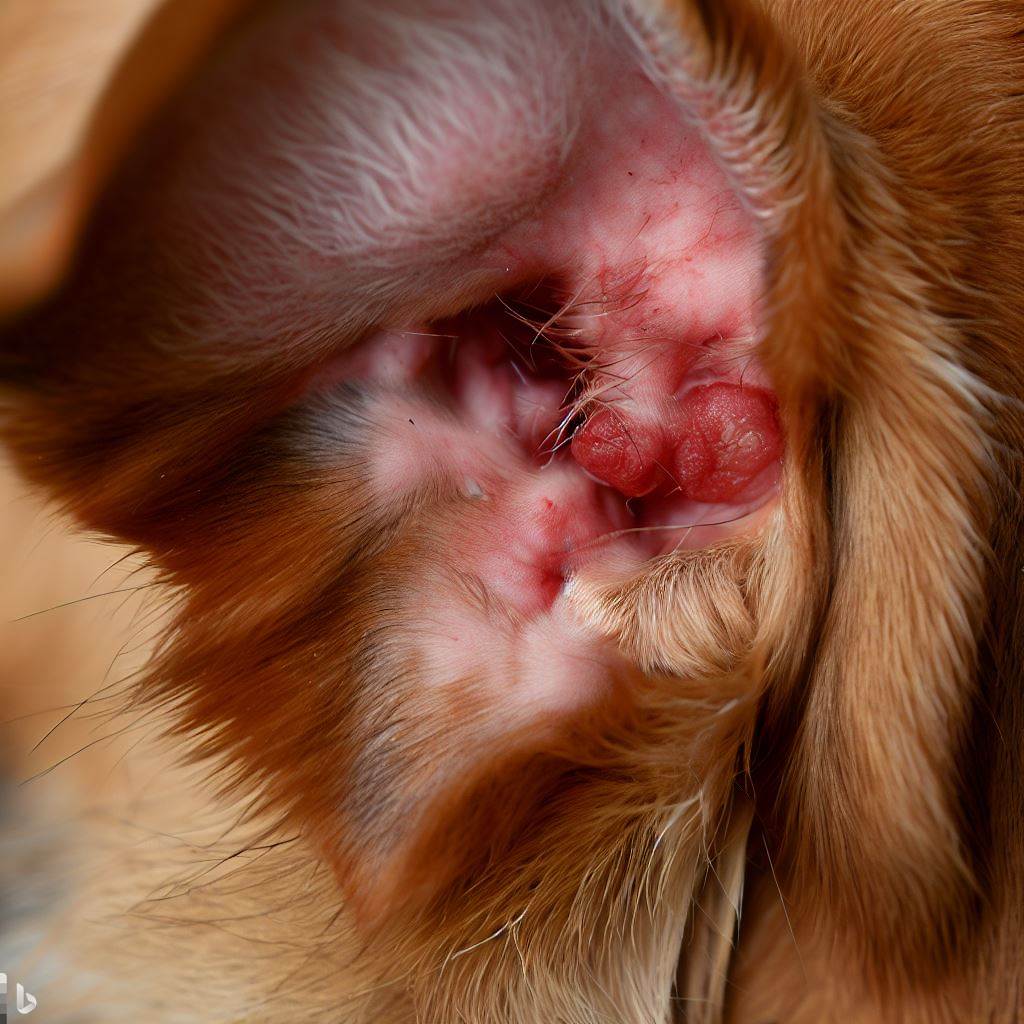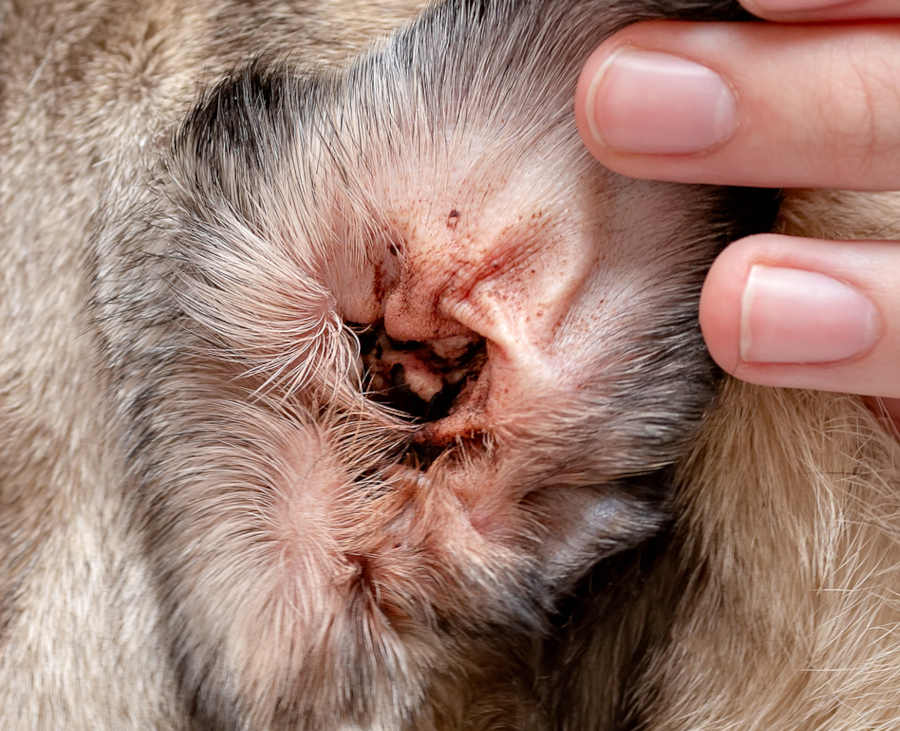Dog Ear Infection
Is your dog suffering from an ear infection?
As a dog owner, you may have noticed your furry friend scratching their ears more often than usual, which could indicate an ear infection. Let's chat about what causes dog ear infections, how to recognise the symptoms, and what you can do to help your pet feel better.
We’re here to help!
Ear infections are a common problem in dogs and can be very upsetting for the dogs and owner alike. No one wants to see their dogs in pain and suffering with constantly inflamed ears.
What causes Dog Ear Infections?

The shape of a dog's ear canal tends towards ear inflammation and infections, as they are either J or L shaped, so a perfect form for debris, water and bacteria to get stuck and cause inflammation and infection. Also, dogs with large floppy ears are more prone to ear infections, as the floppy ears cover the ear canal and make it an excellent warm environment for bacteria to breed. But many factors can cause ear infections in dogs:
- Excessive moisture from bath time or swimming
- Environmental allergies
- Food allergies
- Foreign bodies such as grass seeds
- Trauma to the ear
- Secondary to other diseases, such as Hypothyroidism and Autoimmune diseases
From a homeopathic point of view, dog ear infections often signify an internal imbalance in the body. We help lots of dogs in our clinic with chronic ear problems. Check out below what options we offer.
The Three Types of Ear Infections in Dogs
The three types of ear infections that affect dogs are all otitis, which means ear inflammation. Otitis Eterna is the most common ear disease and is when the cell membranes lining the ear's outer part become inflamed. Otitis Media is a middle ear infection, and Otitis Interna is an inner ear infection.
Often, dogs with other skin problems will also have issues with their ears. This is because the skin and ears go hand in hand. Contact allergies are an excellent example of a problem we can help you with, so read further.
The three types are:
- Otitis Eterna – inflammation of the ear canal (the most common type)
- Otitis Media – inflammation of the middle ear
- Otitis Interna – inflammation of the inner ear

Symptoms of Dog Ear Infections
Usually, your dog's ear will be clean and dry with no smell or discharge. Like human skin, bacteria and yeast always have a good balance, but when things become out of balance, this overgrows and causes inflammation and infection.
Your dog will show some or all of the following symptoms:
- Scratching of the ears
- Shaking the head
- Fluid discharge from the ears
- Offensive odour from the ears
- Swelling and redness of the ear canal
- Heat – ears may be hot to touch
- Pain – your dog may cry when scratching
- Lethargic or off their food
Either one or both ears may be affected. Ear infections in dogs can be sudden and acute or become recurrent long-term chronic ear infections.
Haematomas (swollen puffy ear flaps) can develop on the ear, caused by trauma from too much scratching or shaking of the head. We have an excellent little remedy to help with this, so get in contact.
How to Clean your Dogs Ears
- Cotton buds should not be used to clean your dog's ear, as these can push debris further into the ear canals, causing more severe problems.
- It is best to use just a saline solution to clean the ears. You can make this by boiling water, letting it cool and adding salt. ¼ of a teaspoon of salt to ½ cup of water. Clean natural cotton ball.
- Squirt enough of the saline solution into the ear to fill the canal. Massage the ear gently until you hear squishy sounds.
- Gently pull the ear out from the bottom. This will straighten out the ear canal.
- Shape the cotton ball into a tube and gently push it into the ear. Gently massage the ear again and twirl the cotton ball around, so it absorbs the fluids and removes debris. Repeat if needed.
What can help with dog ear infections naturally?
Here at Natural Pet in our Tagiwig range, we have our Ears remedy to help. It is homeopathic and designed to assist  your dog or cat with ear inflammation, infection, and ear mites in dogs and cats.
your dog or cat with ear inflammation, infection, and ear mites in dogs and cats.
Reoccurring ear infections are a sign of a more chronic health issue. One of the things associated with this is a leaky gut. Yes, just like humans, our pets can get leaky guts too. Check out our page on Leaky Gut, Does your Pet have One? Or our Leaky Gut Kit. Sorting out the gut system will go a long way to helping your dog overcome ear infections.
We also offer aconsultation service, where we can develop a plan individualised for your animal and help to get their health back on track. We can do this via phone or zoom as we help pets in NZ and worldwide.
FAQs
How do I prevent ear infections in dogs?
To prevent ear infections in dogs, regularly clean their ears with a pet-specific solution, keep their ears dry after swimming or bathing, trim excess hair around the ears, address underlying health conditions, and schedule regular check-ups with a vet to detect and treat any ear problems.
Can I clean infected dog ears myself?
You can clean your infected dog"s ears yourself, but be sure to avoid using cotton buds as these can push debris further into the ear canal, causing more severe problems. It is best to use a saline solution to clean the ears. You can make this by boiling water, letting it cool, and adding salt. Use a clean natural cotton ball to apply the saline solution to your dog's ears.
When should I take my dog to the vet for an ear infection?
If you suspect your dog has an ear infection or if the symptoms persist for more than a day or two, you should take your dog to the vet for an examination. You can also book a consultation with us for long-term natural solutions to help with recurring ear infections.
Recent Articles

20% Off
All Cat Remedies
Lorem Ipsum is simply dummy text of the printing and typesetting industry. Lorem Ipsum has been the industry's standard dummy text ever since the 1500s, when an unknown printer took a galley of type and scrambled it to make a type specimen book. Lorem ipsum dolor sit amet, consectetur adipiscing elit. Vivamus leo ante, consectetur sit amet vulputate vel, dapibus sit amet lectus.



 Earn loyalty points everytime you shop
Earn loyalty points everytime you shop
